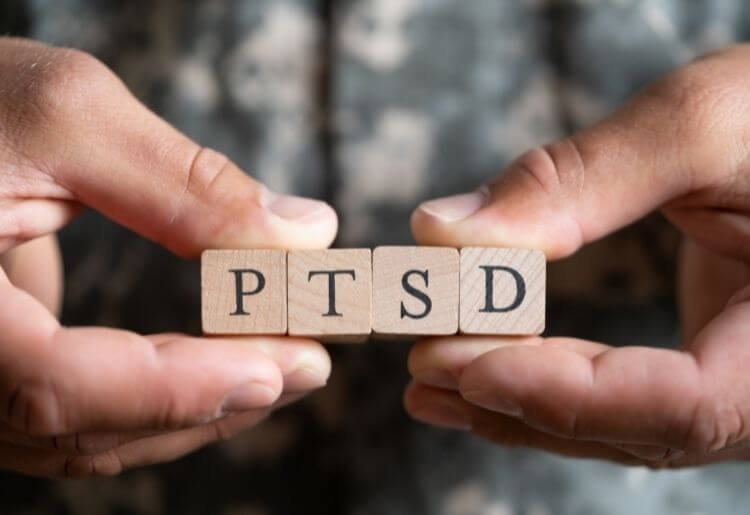Luckily, a lot of research has been done on the condition, and there are multiple treatment options available. With the help of online therapy, you can learn how to cope with PTSD and eventually recover from this condition entirely. Read on to find out exactly what PTSD is and what help is available if you or someone you know is suffering.
1. What is PTSD exactly?
Post-traumatic stress disorder (PTSD) is a mental health condition that can occur in people who have experienced a traumatic event. After such an event, most people will experience disconnectedness, sudden fear, nightmares, and an inability to stop thinking about the event.
If these symptoms last more than a month and are significant enough to interfere with your relationships or work, you are considered to suffer from PTSD. Recovery from PTSD without help is not guaranteed. In fact, your PTSD symptoms can become worse if it’s left untreated.
2. What causes PTSD?
While PTSD is often associated with experiencing war trauma, it can develop after any event that is experienced as traumatic. This means there isn’t a fixed list of events that cause the disorder, but the most common causes are the following:
- Combat exposure
- Childhood physical abuse
- Sexual violence
- Physical assault
- Being threatened with a weapon
- An accident
Some of these causes are more likely to lead to mental health problems than others. According to one study, the events that most frequently result in PTSD are:
- Rape (49% of victims)
- Severe beating or physical assault 31.9% of victims)
- Other sexual assault (23.7% of victims)
- Serious accident or injury (16.8% of victims)
- Shooting or stabbing (15.4% of victims)
- The sudden, unexpected death of a family member or friend (14.3% of victims)
- A child’s life-threatening illness (10.4% of victims)
- Witness to killing or serious injury (7.3% of victims)
- Natural disasters (3.8% of victims)
3. PTSD can be caused by non-life-threatening events
You can develop symptoms of PTSD even after a non-life-threatening event, as long as you experience the event as traumatic and even if other people would not find the same event traumatic.
In an interesting case, a person was recorded to develop PTSD after eating a candy bar that later turned out to be infested with maggots. As a result, this person suffered from a range of PTSD symptoms, such as depression, insomnia, a lack of energy, and an inability to feel pleasure.
There have also been cases where people developed PTSD after experiencing a divorce or a miscarriage.
4. How many people suffer from PTSD?
PTSD affects 3.5% of U.S. adults every year, a total of 11.5 million people. And according to the UK National Health Service (NHS), PTSD develops in about 1 in 3 people who experience severe trauma. Furthermore, women are twice as likely to suffer from PTSD than men. This difference may be explained by the fact that women are much more likely to be a victim of rape than men.
PTSD symptoms can occur in people of all ages and backgrounds, even though some ethnic groups—U.S. Latinos, African Americans, and American Indians—have higher rates of PTSD than non-Latino whites.
5. How long does PTSD last?
The course of the illness varies largely, and while some experience symptoms for only a few weeks, others might suffer for a lifetime if left untreated. However, it is believed that everyone goes through the following 3 stages in the progress towards recovery.
The Impact Stage
You enter this stage right after the traumatic event, during which you are emotionally consumed by what happened. In this stage, people often experience shock, fear, post-traumatic stress, and anxiety as a direct result of the traumatic event.
The Acceptance Stage
You enter the acceptance stage after your initial emotions have settled. This means that you have accepted what has happened to you but does not necessarily mean you have recovered from PTSD. You can still suffer from long-term PTSD symptoms during this stage.
The Recovery Stage
During the recovery stage, you learn how to cope with your post-traumatic stress. You may still suffer, but will be better able to stop post-traumatic stress from overly affecting your state of mind.
There are effective post-traumatic stress disorder treatments that will help you move through these stages effectively, as we will now discuss.

6. Cognitive Behavioral Therapy is an effective PTSD treatment
Cognitive behavioral therapy (CBT) has been found effective in treating PTSD. CBT teaches you to recognize and change unhealthy or destructive thought patterns. It is based on the principle that negative thoughts cause or contribute to emotional difficulties, like those experienced by somebody with PTSD.
A therapist might help a patient with PTSD to identify the negative thoughts associated with certain real-world triggers, like the sound of an ambulance, and actively replace them with neutral, objective thoughts.
This is typically achieved using a variety of coping mechanisms like journaling, mindfulness, role-playing, and mental distraction. Over time, the negative thoughts, and thus negative emotions associated with the sound of an ambulance, are replaced with neutral ones.
7. Exposure therapy can help patients cope with the symptoms
Exposure therapy is an established method of treating PTSD, and it’s one of the most common types of therapy. It requires you to focus on or partially relive the details of a traumatic experience in a safe environment. You’re progressively exposed to your PTSD triggers so that you can better cope with them whenever they occur in real life.
For example, if you’ve been traumatized by combat, a therapist can expose you to a virtual combat area with the use of virtual reality (VR) devices. This kind of non-dangerous exposure can dampen the traumatic symptoms. Exposure therapy isn’t always easy, but it can help people change and grow.
If you want to experience exposure therapy yourself, the online therapy provider TalkSpace can connect you with a specialized therapist.
However, some people that suffer from PTSD might not benefit from exposure therapy. The complexities of multiple traumatic experiences might cause patients to be negatively impacted by exposing them to triggers, especially when the patient has not yet accepted that the trauma has happened. In these cases, a combination of exposure therapy with other treatments can be more efficient.
8. Anti-anxiety medications may help relieve traumatic stress
In addition to therapy, medications can help you cope with the negative symptoms of PTSD, such as anxiety. To this end, antidepressants such as fluoxetine, paroxetine, sertraline, mirtazapine, amitriptyline, or phenelzine are sometimes used in adults.
Alternatively, some antipsychotics like quetiapine, risperidone, and olanzapine are sometimes prescribed “off-label.” This means that these medications have not been officially approved to treat PTSD but could still be effective in treating some symptoms.
Some studies have found that anti-depressants have little to no effect on children, and there is little data available on alternative PTSD medications for children. Instead, children are better treated through counselling, and there are specialist services available, including for teens.
What’s more, to fully recover from your PTSD, you shouldn’t solely rely on medications. They should only be prescribed in addition to some type of psychotherapy that helps you to overcome your triggers.
9. Some medications may not be effective
How effective will a type of medication be in treating your PTSD? As the answer so often is, it depends.
Some antidepressants can initially help you cope with PTSD but lead to more mental health issues down the line. For example, some people experience severe side-effects by using fluoxetine for their PTSD treatment, including emotional numbness, a lack of energy, and even suicidal thoughts.
Additionally, there has been some debate over the efficiency of some frequently prescribed medications. For example, Prazosin has been prescribed to PTSD patients to help reduce or suppress their nightmares. But a 2021 report has found researchers have disagreed over the resulting effects of the medication.
In the end, you should always speak with a doctor in order to determine if your situation might merit a type of medication.
It’s also important not to self-medicate. Using alcohol or drugs in order to numb your feelings isn’t healthy. Furthermore, it can amplify your symptoms in the long term and interfere with other treatment types.
10. Support groups can help you cope with PTSD
It’s been found that spending time with supportive people can help you cope with the symptoms of PTSD. Spending time with family, friends, or peers can help you digest your traumatic experience and overcome it. You don't have to necessarily talk about the details of what happened. Just sharing time with someone who cares about you can help you cope.
There are also a number of charities and support groups that provide peer support and advice for people that suffer from PTSD:
- PTSD USA
- The Daily Strength online support groups
- The CPTSD Foundation
- The PTSD subreddit
Also, May is Mental Health Awareness Month, which means that some people are generally more open to supporting people with mental health conditions. Simply speaking up about your experiences with PTSD can help others deal with their own symptoms better.
You're not alone in coping with PTSD
If you’re struggling with the aftermath of a traumatic experience, you need to know the potential impacts on your mental health. PTSD can be caused by any event that is experienced as traumatic, and the symptoms may last for the rest of your life if you don’t find treatment. You can recover from the symptoms of PTSD with the help of psychotherapy and medications through a top online therapy service that specializes in trauma.
